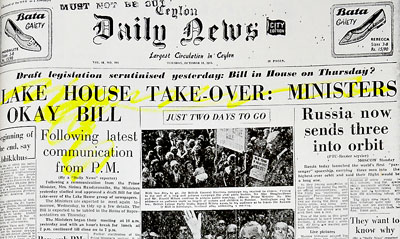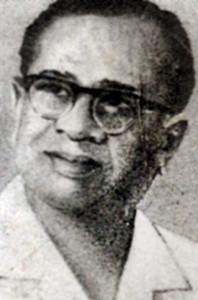Sunday Times 2
Maithripala joins CP in fight for democracy and press freedom
Fifty years ago, on the historic day of 3rd of December 1964, the unthinkable happened in Parliament. C.P. de Silva, the deputy leader of the SLFP, Leader of the Government in Parliament, Leader of the House and Lands, Land Development, Irrigation and Power Minister, crossed the floor of the House with 13 SLFP members and triggered a defeat of the powerful government of Sirimavo Bandaranaike by one vote at the vote on the “Throne Speech”. Another MP, Amarananda Ratnayke (Passara), had a flat tyre and did not come to vote.
Those who defied the SLFP whip with CP were Wijebahu Wijesinghe (Mirigama), Edmund Wijesuriya (Maskeliya), A. H. de Silva (Pollonnaruwa, brother of CP), Indrasena de Zoysa (Ampara), C. P. Wickramasuriya (Devinuwara), Albert Silva (Monaragala), S. B. Lenawa (Kekirawa), Sir Razeek Fareed (Colombo Central), Lakshman de Silva (Balapitiya ), D. E. Tillakeratne (Ratgama ), R. Sigleton Salmon (appointed MP) and Mahanama Samaraweera (Matara, father of Mangala Samaraweera).
CP sacrificed all his power and privileges in the defence of media freedom at a time when the topic was not widely discussed as it is today. CP and 13 other SLFP members also took the risk of facing by-elections in their respective constituencies in the event the Government did not fall. At the ensuing election in 1965, people reelected CP and several others MPs who contested under a new party ‘Sri Lanka Freedom Socialist Party’ and a new symbol the ‘rising sun’ and the UNP formed a “national government”.

The Daily News front page on October 13, 1964 reported the then government’s move to take over Lake House. The move triggered the C.P. de Silva-led crossover that toppled the government.
India’s Prime Minister Narendra Modi stated recently at Madison Square Garden in New York that “winning elections is not about gaining power but is all about responsibility”. Fifty years ago, CP showed how valid that statement was. Unfortunately, Ms. Bandaranaike went ahead with her ill conceived policy in 1972 and nationalised Lake House after regaining power in a landslide victory in 1970. This resulted in an attack on the fabric of democracy, an increase in cheap political rhetoric, bias reporting and disregard of another point of view and the blatant abuse of the democratic opposition as anticipated when the Press Council Bill was introduced amidst CP’s vehement opposition.
Ever since the demise of C. P. de Silva in 1972, numerous articles written by former government agents, ministry secretaries, engineers , politicians and historians have paid tribute to this great democrat and humble politician. These articles refer to the services he rendered to the people of the Polonnaruwa District in particular and to his stewardship of the subjects of agriculture, land development, irrigation, power and his personal attention to human settlements in the hostile environments of the dry zone and his great contribution to the opening of irrigation schemes in the Polonnaruwa District. In doing so, CP never forgot the importance of the forest resources and the human-elephant conflict. Therefore, he conceptualised and planned the massive Mahaveli Development project to conclude it in 30 years. Prime Minister Dudley Senanayake laid the foundation stone for the Diversion of the Mahaveli at Polgolla in 1969.
His brilliance as a student in science and mathematics and obvious talent as the youngest Civil Servant to pass out at the age of 23 had prompted D. S. Senanayake to hand pick CP to be his confidant to open up the Rajarata jungles and restore ancient irrigation systems in the dry zone. His deliberate decision not to marry was the catalyst that made him live and work in harsh surroundings with the people of Rajarata. The greatest tribute the people paid him was to refer to him as the “Minneriya Deviyo”.
C. P. De Silva had a rare upbringing for a politician. He gave special attention to education while establishing reservoirs and channels. He built the Polonnaruwa Royal College and the Medirigiriya Central College along the lines of Royal College, Colombo. The schools were built with hostels, staff quarters and cricket grounds. Today, these schools produce doctors, lawyers and engineers for the country.
Many aspects of CP’s life, from 1935 to 1950 — as a Cadet in the Jaffna Kachcheri, Assistant Government Agent in the Puttalam, Anuradhapura and Pollonnaruwa Districts for 10 years, Assistant Land Commissioner and Director Land Development — was worthy of emulation by the present day members of the administrative services. He was not afraid to display the courage of his conviction when he resigned from civil service in 1950 over difference of opinion with his Minister. He simply settled down on a farm at Tabbowa in Puttalam.

C.P. de Silva
As a politician, CP continued to perform his functions as a gentleman politician. He never took revenge from his political opponents or amassed wealth. He treated UNPers and SLFPers alike. In fact, the land on which he finally built a house for himself in Minneriya as late as the mid-1960s was purchased from three owners who had freehold land. He did not allocate for himself any State land in Polonnaruwa although he could have easily done so. Much respected public officials K.H.J. Wijedasa (former GA Polonnaruwa and Secreatry to the President ) and R. S. Jayaratne (Retired Secretary to the Ministry of Home affairs and Plantation Industries) in articles paying tribute to CP, recalled how they would pick up their Minister from the Hingukkgoda or Polonnaruwa railway stations and provide him a jeep during his stay in the district.
C. P. de Silva’s brave act of resignation from the SLFP he loved , has once again assumed great significance after 50 years. It is a coincidence that the common opposition Presidential candidate, who was a member of the SLFP for 40 years and who resigned from his Ministry and General Secretary’s post of the SLFP after 17 long years, is also from the Polonnaruwa District. One of the main policy statements of Maithripala Sirisena is the promise to restore Press Freedom in Sri Lanka which has been seriously eroded.
During CP’s time, politics of the country was comparatively less complicated. general elections resulted in either the UNP or the SLFP coming to power. Police and the Judiciary acted independently. Ministry secretaries dared not indulge in any kind of politics despite working closely with the government in power. The opposition was able to conduct its campaigns without interference. Those who lived and enjoyed the political culture then would recall the occasional abrasions that occurred during a by-election or a general election, with a laugh after the event. Elections were fought according to rules of conduct and State power was not misused. The defeated party never accused the winner of irregularities. There was no accusation that misuse and abuse of State machinery caused an unfair advantage to the government. The Elections Commissioner was respected and left alone to conduct an impartial election with the support of an independent police force. No attempt was ever made to conduct local government elections on a scattered basis so that the ruling party could abuse the process and pocket victory at each local government election.
Despite the relatively free and fair elections then, CP did not wish that the freedom of the press should be tinkered with by a government as it would lead to future abuse of power. In his farewell speech to the House he said famously, “I like to a live a free man in a free society.” He may have been reminded of Christopher Dodd, the famous US politician who once said that when the people’s right to know is threatened and when the right of free speech and freedom of the media is at risk, all other liberties we hold dear, are gravely endangered.
The warnings he gave was proved right after 1972. Successive governments gradually increased misusing Lake House newspapers and the media at large. Threats on journalists increased, leading to killing, maiming and prostituting journalism. All governments failed to lead journalists on the path of journalistic ethics. Today, even progressive legislation such as the Right to Information Act has been denied to the hapless people of Sri Lanka.
C.P. de Silva had to overcome a personal pain of mind before resigning from the SLFP as he within one year of the formation of the SLFP, became the trusted man of S.W.R.D. Bandaranaike in the 1952 SLFP Parliamentary group and thereafter. CP almost died by drinking unsuspectingly a glass of milk brought for his leader SWRD at a Cabinet meeting on August 25, 1959. On September 25, SWRD was shot, all due to conspiracy from within the SLFP. CP was recuperating in London and could not assume Premiership. C.P. led the SLFP in the March 1960 general elections from his sick bed and fell short by four seats. As a gentleman politician, he persuaded a reluctant Ms. Bandaranaike to accept the leadership of the SLFP to face the July 1960 elections and the SLFP won. But Ms. Bandaranaike sat in the Senate while CP led the SLFP in Parliament. But by 1964, grounds were created for this SLFP stalwart to resign from the SLFP. Like Ms. Bandaranaike leading the Government from the Senate then, President Rajapaksa today leads the Government from the President’s House. As a result, both leaders lost touch with ground reality and became oblivious to the discontent rising from within its ranks. ‘Outsiders’ caused much of the SLFP discontent. CP opposed the induction of Marxist LSSP and the CP into the government by Ms. Bandaranaike. It is said that they influenced Ms. Bandaranaike to take over of Lake House. Aristocratic members of Ms. Bandaranaike’s family began to isolate CP and likeminded MPs. It culminated in a personal attack on CP by Jaya Pathirana MP in the House. No disciplinary action was taken against him for breach of party discipline.
Similarly, a large number of crossovers from the UNP to the SLFP during President Mahinda Rajapaksa’s second term caused Maithriplala Sirisena and many other SLFP seniors to face the twin issues of an overpowering Presidency, blatant corruption and an arrogance of power. As an old guard, Sirisena like CP, felt isolated and powerless and decided to strike back with four other MPs initially, promising more to follow. A presidential election two years before the Presidential term ends has made Sirisena confront the President himself at the forthcoming presidential election.
It may be noted that the CP-led crossovers from the SLFP enabled a joint opposition to form a National Government. It is interesting to see if the Maithripala Sirisena-led cross over 50 years later will enable the joint opposition to establish a National Government.

